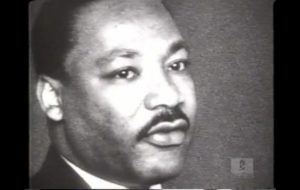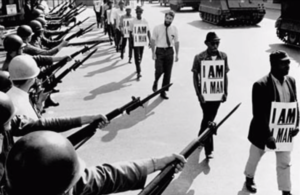Minds of the Movement
An ICNC blog on the people and power of civil resistance
by Steve ChaseApril 02, 2018

Click to expand. Source: Poor People's Campaign.
Before December 1, 1955, Martin Luther King did not know Rosa Parks. He was 26 years old and still new to town. His church was one of the smallest, wealthiest, and most conservative of the two-dozen black churches in Montgomery. His professional ambitions at the time were to run a solid church program, be well paid for it, have a nice house for his growing family, perhaps write some theology pieces for his denomination’s magazine, and do a bit of adjunct teaching at a nearby college after he was better established. King’s long-term career goal was to become a college president.
King had never imagined himself as a prominent civil resistance leader in Montgomery, let alone the U.S. Yes, he had experienced racism, and hated it, but all black folks in the country had experienced racism and hated it. He had also read a bit of Gandhi and Marx at Boston University and written several thoughtful papers about the social gospel movement theologians who challenged the Church to take up the fight for social justice.
Yet, in December 1955, all these ideas were mostly academic concerns for King. His only act of activism up to this point had been to write a letter to the editor of the Atlanta Constitution when he was 17. He had even turned down an invitation to serve on the board of the state chapter of the National Association for the Advancement of Colored People (NAACP), co-founded in 1909 by the great U.S. civil rights activist, Pan-Africanist, author and writer W.E.B. Du Bois.
It is hard to imagine now, but if it had been left up to King’s initiative, the Montgomery Bus Boycott would never have happened. One of the key organizers of that effort was Edgar Daniel Nixon, known as E.D. Nixon, an experienced civil rights and labor activist who created the Montgomery Improvement Association, which then launched the Montgomery Bus Boycott within the first four days after Rosa Parks’ arrest. It was Nixon who recruited a very reluctant King to this city-wide civil resistance campaign.
How did Nixon do this? After bailing Rosa Parks out of jail for refusing to move to the back of the bus on that historic day in December, Nixon and Parks talked together for hours and decided to launch a city-wide boycott of the segregated bus system. Parks then started contacting the members of the Montgomery Women’s Political Caucus, which had long proposed a boycott. Nixon went home and started calling local ministers to line up their support. As Nixon explained to one interviewer: “I recorded quite a few names… The first man I called was Reverend Ralph Abernathy. He said, ‘Yes, Brother Nixon, I’ll go along. I think it’s a good thing.’ The second person I called was the late Reverend H.H. Hubbard. He said, ‘Yes, I’ll go along with you.’ And then I called Rev. King, who was number three on my list, and he said, ‘Brother Nixon, let me think about it awhile, and call you back.’”

Click to expand. Source: Poor People's Campaign.
When King finally talked to Nixon later that day he said he was still skeptical about boycotts being a moral strategy, but he agreed to come to a meeting to discuss launching one. Nixon chuckled and told King, “I’m glad you agreed, because I already set up the first meeting at your church.” At the ministers’ meeting, King was still very nervous about the controversial boycott idea and several other ministers soon began to side with King against Nixon’s boycott plan. In his own memoir of the Montgomery Bus Boycott, King recalls how Nixon finally exploded towards the end of the meeting and shouted that the ministers would have to decide if they were going to act like scared little boys or if they were going to stand up like grown men and take a strong public stand for justice and against segregation.
King’s pride was so hurt, he shouted back that nobody could call him a coward. Then, to prove his courage, King quickly agreed to Nixon’s proposal for an aggressive, community organizing campaign to build up the boycott. With the rest of the ministers following King’s new commitment to the campaign, the group then began to discuss who should lead this effort. Everyone present had expected Nixon to become the president of the newly formed Montgomery Improvement Association. But when he was asked about serving, Nixon answered, “Naw, not unless’n you all don’t accept my man.” When asked whom he was nominating, Nixon said, “Martin Luther King.” Having just loudly declared his courage to the whole group, King felt that he had to agree to take on this responsibility. Then, Nixon told King he would have to give the main address at the mass rally scheduled for that very night to announce the boycott plan to the black community.
After an inner struggle, King rose to Nixon's challenge. Serving as the public leader of the Montgomery Bus Boycott for the next 12 months changed King. Watching 42,000 poor and working-class black people stay organized and do without public transportation for a year, he discovered things about the courage and capacity of ordinary people to resist oppression and move toward freedom using a version of Gandhi’s technique of civil resistance. Watching the conservative, rightwing city government finally cave in to the boycott, he discovered the power of mass nonviolent civil resistance campaigns to win real victories—even when they are opposed by powerful interests. By seeing his own power to inspire people to become active citizens for a noble cause, King also discovered just what kind of leader he wanted to be. He now fully embraced his new mission as a civil resistance leader for fundamental social change that would address racism, militarism, and economic injustice—the triple sins of U.S. society so ably named by King.
There is an important lesson here for all of us today who are drawn to King’s unfinished “revolution of values.” We don’t have to be born leaders, we don’t have to know everything before we get started, we just have to get started. Let our memory of King be the E.D. Nixon in our lives, the outward pressure that prompts us to either get started or to keep on keeping on. I know this May, I will be participating in civil disobedience as part of the revival of Rev. King’s Poor People’s Campaign here in Washington, DC.
What is your next step?

Steve Chase
Steve Chase is a long-time activist, educator, and writer and previously worked as Manager of Academic Initiatives for ICNC. He is currently the Assistant Director of Solidarity 2020 and Beyond, a solidarity network and community of practice for grassroots movement organizers in the Global South using advocacy, peacebuilding, and nonviolent resistance to win sustainability, rights, freedom, and justice.
Read More